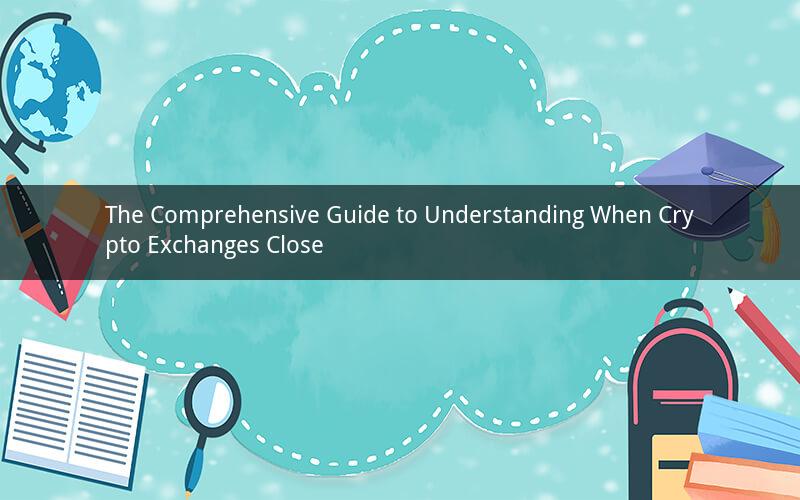
Cryptocurrency exchanges play a pivotal role in the crypto trading landscape. However, there may be instances when these platforms decide to close their operations. This article delves into the various reasons behind the closure of crypto exchanges, the factors that trigger such decisions, and the implications for traders.
1. Market Conditions
One of the primary reasons crypto exchanges close is due to unfavorable market conditions. In times of significant market downturns, such as the 2018 crypto winter, several exchanges faced financial difficulties. The plunging value of cryptocurrencies led to a decline in trading volumes, making it challenging for exchanges to sustain their operations.
2. Legal and Regulatory Challenges
Crypto exchanges operate in a highly regulated environment. They must comply with numerous laws and regulations, including anti-money laundering (AML) and know your customer (KYC) policies. When exchanges face legal or regulatory challenges, they may opt to close rather than continue operating under uncertain conditions.
3. Security Breaches
Security is a major concern for crypto exchanges. Hackers often target these platforms in search of valuable cryptocurrency. When exchanges experience significant security breaches, they may choose to close temporarily or permanently, depending on the severity of the incident.
4. Technological Issues
Technological issues can also lead to the closure of crypto exchanges. Malfunctions in the trading platform, issues with the exchange's infrastructure, or cyber attacks can disrupt operations. In such cases, exchanges may temporarily halt their services until the issues are resolved.
5. Poor Management or Financial Struggles
In some instances, the closure of a crypto exchange can be attributed to poor management or financial struggles. This includes inadequate capital reserves, failed business models, or mismanagement of resources. When exchanges face insolvency or other financial challenges, they may have no choice but to close.
Implications for Traders
The closure of a crypto exchange can have several implications for traders:
1. Loss of Funds
Traders holding assets on an exchange that closes may face the loss of their investments. This highlights the importance of choosing a reputable exchange and maintaining a diverse portfolio to mitigate such risks.
2. Market Impact
The closure of a significant crypto exchange can lead to volatility in the market. This is because the affected exchange may have been a major trading hub, impacting the overall liquidity and market dynamics.
3. Transitioning to a New Platform
Traders who lose their preferred exchange must find alternative platforms to continue their trading activities. This process can be challenging, as it requires thorough research and understanding of the new platform's features and regulations.
5 Questions and Answers
1. Question: Can a crypto exchange close permanently?
Answer: Yes, a crypto exchange can close permanently due to various reasons, such as financial difficulties, regulatory challenges, or security breaches.
2. Question: How can traders protect themselves from the closure of a crypto exchange?
Answer: Traders can protect themselves by choosing reputable exchanges, diversifying their portfolio, and staying informed about the regulatory landscape.
3. Question: What should traders do if their exchange closes?
Answer: Traders should withdraw their funds to a secure wallet, research alternative platforms, and assess the risks associated with each new exchange.
4. Question: How does the closure of a crypto exchange affect the overall market?
Answer: The closure of a significant crypto exchange can lead to market volatility, decreased liquidity, and potential regulatory scrutiny.
5. Question: Are there any alternatives to crypto exchanges for trading cryptocurrencies?
Answer: Yes, traders can consider decentralized exchanges (DEXs), peer-to-peer (P2P) platforms, and over-the-counter (OTC) trading to continue their trading activities without relying on traditional centralized exchanges.
In conclusion, the closure of a crypto exchange can be a result of various factors, including market conditions, legal challenges, security breaches, and poor management. Traders must remain vigilant and take necessary precautions to protect their investments in the event of such closures. By staying informed and choosing reliable platforms, traders can navigate the ever-evolving crypto trading landscape.